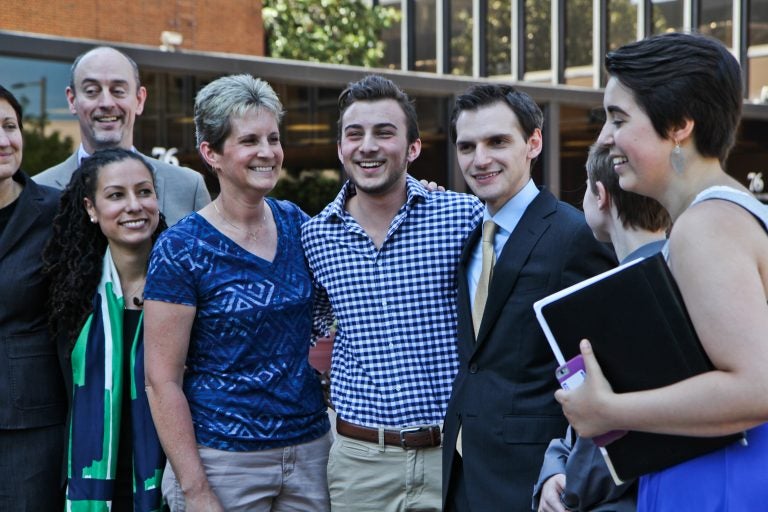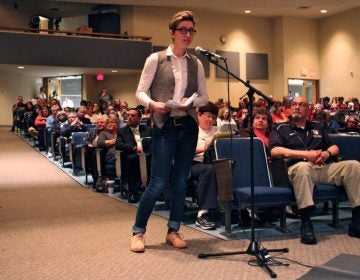Federal court upholds Boyertown school bathroom policy; appeal likely
A federal appeals court in Philadelphia has upheld the policy of a Berks County school allowing transgender students to use the bathroom of their choice.
Listen 2:55
Aidan Destefano (center, checkered shirt) outside of the Philadelphia Federal Courthouse with his legal representation. (Kimberly Paynter/WHYY)
A federal appeals court in Philadelphia has upheld the policy of a Berks County school allowing transgender students to use the bathroom of their choice.
The decision from a three-judge panel of the U.S. Court of Appeals for the 3rd Circuit affirms a lower court finding that permitting transgender students at Boyertown Area School District to use bathrooms and locker rooms that correspond with their gender identity does not violate the “bodily privacy rights” of other students.
“To suggest that your transgender identity isn’t valid until you have hit some marks set by other people,” said Mary Catherine Roper of the ACLU of Pennsylvania, who helped defend the transgender students in the case,“fundamentally disregards what it means to be transgender, which is about an individual sense of self.”
The conservative group that brought the challenge has vowed to appeal the quick Thursday ruling from the bench — a highly unusual move for the appeals court. It follows a decision last year from federal Judge Edward Smith that the presence of a transgender student in bathrooms and locker rooms at the school is not “hostile, threatening, humiliating,” or a constitutional violation.
For Aidan DeStefano, a transgender man who graduated from Boyertown High School last year and has been involved in the case, there was a simple takeaway from decision.
“Just don’t question people. Let them be who they want to be, and they’re literally doing what everyone else does: Wash their hands, go to the bathroom, maybe fix their hair in there,” he said. “That’s pretty much it.”
Schools officials have said that if students were worried about privacy, they could change their clothes in single-user bathroom stalls and use private showers in the locker rooms.
The solution, according to Ria Tabacco Mar, an attorney with the ACLU’s Lesbian Gay Bisexual Transgender & HIV Project, is not to exclude transgender students from using the bathrooms in which they feel most comfortable.
“It’s understandable that changing clothes in front of students and classmates of any gender can be uncomfortable,” Mar said. “But the solution to that is exactly what the school has done here, which is make private arrangements available to all students. Not to banish transgender students and to send a message that who they are is unacceptable.”
During Thursday’s oral arguments, Randall Wenger, chief counsel of the Harrisburg-based Independence Law Center, a conservative, faith-based group, told the three judges he would like to see a “return to the status quo” to reverse the school’s policy.
The policy shift followed guidance from the Obama administration providing legal protection to transgender students who want to use bathrooms of their choice, guidance that President Donald Trump has voided.
Responding to the status quo argument, Judge Theodore McKee replied, “You could have come here with Brown v. Board of Education. Everybody got along in Plessy, let’s go back to the status quo,” referring to the 1896 decision Plessy v. Ferguson that legalized segregation under a “separate but equal” rule.
The judges questioned how the bathroom policy infringed on the rights of students in Boyertown. Among the legal arguments seeking to dismantle the policy was that it was a violation of the civil rights law Title IX protecting students from discrimination based on gender.
“Your argument is sex is a biological state of affairs,” said Judge Patty Shwartz. “But everybody is being treated the same under the school’s policy. I don’t understand how you can have a Title IX claim.”
Judge Richard Nygaard asked just one question, but it spoke to what the judges saw as a vulnerability of the argument against the school policy.
“In view of the fact that the district made separate accommodations, separate facilities available, where is the irreparable harm?” he said.
After the ruling, Wenger said he plans to appeal the decision to the full 3rd U.S. Circuit Court of Appeals.
“Students should be able to use the locker room and restroom for their intended purpose without fear that someone from the opposite sex will invade their privacy,” Wenger said. “The school cannot unilaterally eliminate privacy rights of other students based simply on another student’s belief on gender.”
WHYY is your source for fact-based, in-depth journalism and information. As a nonprofit organization, we rely on financial support from readers like you. Please give today.



